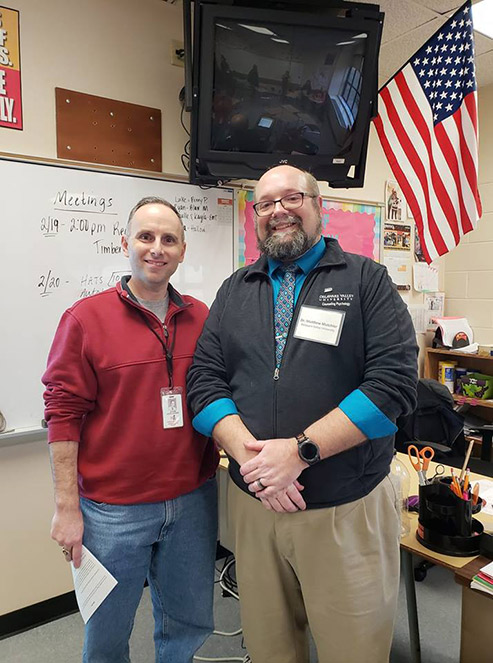The Circle of an Educator’s Life
 Courtesy: Dr. Matthew S. Mutchler Simmons Elementary School Music Teacher John Sedlacsik and Dr. Matthew S. Mutchler, LMFT, Acting Academic Director of Graduate Counseling Psychology
Courtesy: Dr. Matthew S. Mutchler Simmons Elementary School Music Teacher John Sedlacsik and Dr. Matthew S. Mutchler, LMFT, Acting Academic Director of Graduate Counseling PsychologyI was recently invited to run a workshop for the Hatboro-Horsham School District, along with fellow DelVal faculty members Dr. Kathy Wu (Counseling Psychology) and Dr. David Timony (Education). The theme for the day was “The Whole Child” – a holistic approach to K-12 education. We gave talks on creating trauma-informed classroom environments (Dr. Wu), balancing the demands of teaching students with varying educational, social, and emotional needs (Dr. Timony), and attending to self-care to prevent educator burnout (me).
I wear many career hats – one is being a couples and family therapist. Because of this, I read through the list of teachers who had signed up for my talk to check for clients. One name jumped out at me – John Sedlacsik. He was not a client – he was one of my teachers from high school.
<Flashback music plays>
In 1995 I was a senior. I had been a percussionist in the various school bands since middle school. The jazz band was one of my favorites – I got to play a drum kit and there was usually an interesting part. Some of my best friends were also in the band. We had fun, but we were BAD. Our performances were usually only applauded by our families, and sometimes then out of obligation. Enter our new jazz band director, Mr. Sedlacsik. He had been thoroughly briefed on our skills (or lack thereof). This didn’t slow him down. He was able to meet us where we were – people who enjoyed making music but lacked the confidence and experiences of success to take risks or try difficult pieces. He taught us to improvise and gave me a line that I use with my counseling students to this day – “If you make a mistake, make it again” – what you played might not have been what you meant, or what the music says to play, but it just might work. He taught us not only to learn from our mistakes, but to find success in them. That year, we gave a great performance at our spring concert and earned a standing ovation from the audience. It was one of the highlights of my school experience. In part, that gave me the confidence to keep playing when I went to college and joined a larger and more talented group. It was in that group that I first met my wife.
<Flash forward to the present, Dr. Mutchler gains weight and loses hair>
Music has been part of my own self-care routine for years and includes being part of Jess and the Mansplainers with my DelVal colleagues. I emphasize self-care, particularly having fun, in my classes and planned to do so in my talk. It focused on the positive impacts teachers can have on their students when they take care of themselves. Mr. Sedlacsik didn’t recognize me when he came in, so I had the pleasure of being able to tell this story and surprise him by sharing the impact he had on my life. It was an emotional moment and powerfully showed the impact that educators can have. It also represented a developmental moment – the last time we were together I was learning from his expertise: this time he was learning from mine.
Having a meaningful impact isn’t always obvious and many educators never learn just how much they have meant to their students. To have a lasting and meaningful impact takes time, energy and caring. We must take care of ourselves so we are able to care for others. It’s a lesson that rang true for every educator in the room that day, and one that applies to all of us no matter our career paths.
About the Author
Dr. Matthew S. Mutchler, LMFT, is the acting academic director of graduate counseling psychology at Delaware Valley University.